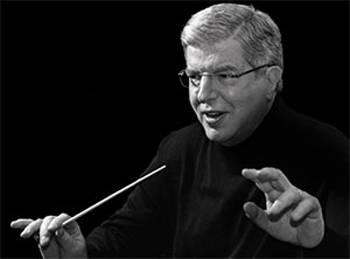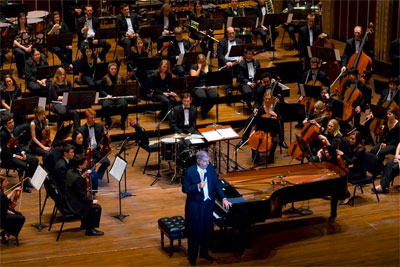by Robert Rollin

Singer/dancer Donna McKechnie won a Tony for her starring role in the original production of A Chorus Line, Hamlisch’s Pulitzer Prize–winning musical. Singer/actress Christiane Noll collaborated with him personally, as did gifted vocalist Doug LaBreque —the latter in concerts with the Chicago and Pittsburgh Symphonies. The Community Chorus, directed by Carol Baird, supported the singers very well.
Hamlisch, a child prodigy who entered Juilliard at age seven, gained early fame as a songwriter for Sunshine, Lollipops and Rainbows, a pop hit he wrote for singer Leslie Gore in 1965. The Youngstown Symphony’s orchestral arrangement included a surprising number of vocal unison passages that seemed a bit contrived, but the three soloists performed their parts well.
Knoll capably sang the lovely “Through the Eyes of Love” from the 1978 movie Ice Castles, but her high range at times seemed strained, her vibrato rather wide. Her duet with LaBreque was quite effective. LaBreque himself showed fine pitch control as well an entrancing tone color in his rendition of “Ordinary Miracles.” His expressive range matched that of Barbra Streisand’s famous performances.

Marvin Hamlisch with the CIM Orchestra at Severance Hall, January 2011
1975 brought Hamlisch both a Tony and the Pulitzer Prize for the musical A Chorus Line, which concerned the personal stories and backstage lives of Broadway dancers. The Overture to A Chorus Line opened the concert in a lively fashion but suffered some minor balance and ensemble mishaps. McKechnie did an excellent job with “Nothing” from A Chorus Line. The other two soloists offered fine support. Local singer Laura Bedina of Boardman was exceptional in her solo.
“Nobody Does it Better,” Hamlisch’s song for the James Bond movie The Spy Who Loved Me, featured fine instrumental entrances by piano, French horn, and glockenspiel. It is one of the composer’s catchiest tunes.
“One Song” from A Chorus Line is another attractive, brassy tune. One of the evening’s highpoints, it also provided inspiration for the title of the concert. “One Song” began with wonderful solo singing by LaBreque. The Community Chorus was subdued but excellent in its backup role. Of the ladies who entered to complete the trio, McKechnie’s diction was especially clear and precise.
After intermission the instrumental version of They’re Playing Our Song seemed a bit tame. From the obscure 1986 musical of the same name that was a flop, “Smile,” the production number that followed, livened things up. The story centered on a beauty pageant, and the Symphony’s attractive costuming of the lovely young women was imaginative. In “Disneyland,” from the same musical, Knoll had a few vibrato problems that made it difficult to discern the text.
Knoll also sang “The Way We Were,” a dreamy love song that helped sell the movie of the same name. Knoll’s humming at the outset worked well, but some of her ornaments later in the performance were awkward.
All three soloists excelled in “What I Did for Love,” yet another lively song from A Chorus Line where Hamlisch’s gift for melody displayed itself once again. This segued to a final reprise of “One Song” for a dynamic conclusion.
Published on ClevelandClassical.com October 21, 2014.
Click here for a printable copy of this article


